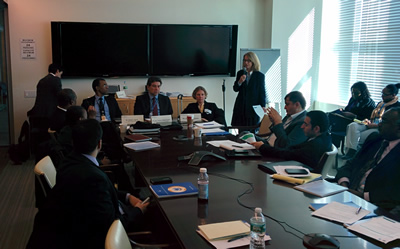UNITAR Hosts Seminar on International Treaty Law and Practice with OLA, including Special Session on Climate Change Law
13-14 November 2014, New York, USA – On 13 and 14 November, the UNITAR New York Office held its biannual OLA*/UNITAR seminar on international treaty law and practice. The seminar served the purpose of providing introductory training for new delegates, who engage in the process and procedure of international treaties. It also equipped delegates with the necessary knowledge and skills to make informed decisions and effectively draft, register, and deposit international treaties with the Secretary-General of the United Nations. Additionally, the event featured a special session on the UN Conference of the Parties (COP), preparing for a new global agreement on Climate Change 2015, which will reduce emissions, strengthen climate resilience, and mobilize political based on the United Nations Framework Convention on Climate Change (UNFCCC).
 For the opening session, Ms. Yvonne Lodico, Head of the UNITAR New York Office, explained the purposes of the seminar and provided an overview of the climate change discussions at the international level. UN Legal Counsel discussed the role of treaties within the UN and international law in conflict resolution, governance and administrative justice, and UN training activities and available online resources. Experts from Office of Legal Affairs explained the basic concepts in treaty law, the evolution of the treaty law system, final clauses and their legal effects, the legal requirements for participation in the multilateral treaty framework, the processes and practices of treaty registration and deposit, and online resources and research tools. Participants were briefed on complicated treaty concepts and issues relating to reservations and declarations.
For the opening session, Ms. Yvonne Lodico, Head of the UNITAR New York Office, explained the purposes of the seminar and provided an overview of the climate change discussions at the international level. UN Legal Counsel discussed the role of treaties within the UN and international law in conflict resolution, governance and administrative justice, and UN training activities and available online resources. Experts from Office of Legal Affairs explained the basic concepts in treaty law, the evolution of the treaty law system, final clauses and their legal effects, the legal requirements for participation in the multilateral treaty framework, the processes and practices of treaty registration and deposit, and online resources and research tools. Participants were briefed on complicated treaty concepts and issues relating to reservations and declarations.
The seminar also included a special session on the upcoming UN Conference of the Parties 20 summit (COP 20), and the preparation for a new global agreement on climate change in 2015. H.E. Mr. Gustavo Meza-Cuadra, Permanent Representative of Peru to the United Nations, provided an overview of the development of international climate change law, including implementation, development and monitoring, since the UNFCCC (1992) and Kyoto Protocol (1997). He also spoke about recent developments in the fields of finance, technology transfer, capacity building and negotiations, with reference to the upcoming COP in Lima. Mr. Elliott C. Harris, Director of the UNEP New York Office, briefed participants on issues relevant to the summit, including: the current geopolitical overlook; the role of the private sector in finance, adaptation and technology transfer; governance and maintenance of the UNFCCC regime; interpretative disputes of agreements; and the issue of carbon pricing. The delegates were also briefed by Ms. Elizabeth Burleson, founder of the Burleson Institute and former professor of climate policy at Pace University. Ms. Burleson noted the difficulty of securing a longstanding international agreement given domestic political timeframes. However, she argued that, by embracing technology transfer, stricter regulatory frameworks, and financing for green energy, states can make major progress in combatting emissions.
Overall, the special session provided participants with the knowledge, skills and insights central to the process of creating and implementing multilateral treaties. Additionally, delegates were briefed on issues relevant to the forthcoming COP in Lima, and the development of a new global climate agreement in 2015.
Related links
*OLA = United Nations Office of Legal Affairs
Photo: Ms. Yvonne Lodico, Head of the UNITAR New York Office, speaking at the seminar

